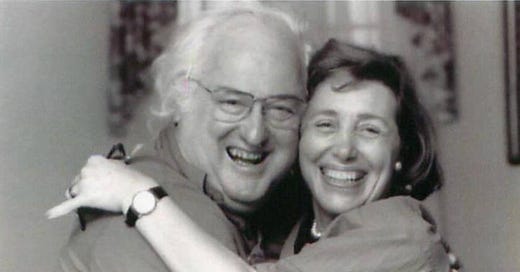One of the best things about being in the same field for decades is that it increases opportunities for knowing and working with giants. This has been shockingly true in my own life.
Charlie and Edie Seashore are among the greats who’ve had a galvanizing effect on my work, and my career. They were early practitioners of the experiential workshop– sessions that translate ideas and research into exercises that raise participants’ real-time awareness about the consequences of their words and actions and give them a chance to practice new habits. I was fortunate to spend time with these two masters while they were living and I wrote a long profile on the transformative nature of their contributions.
I’ve been thinking about Charlie and Edie because I’m now engaged in developing a workshop based on my new book, Rising Together. Before meeting them, I doubted that I could ever deliver an effective workshop because I had not been trained as a facilitator (note: neither had they). As a writer, I saw myself as a content person, more comfortable with ideas than with hands-on engagement. I loved doing keynotes, but my longer-format sessions felt content-heavy and lacked the impact I was seeking.
This was hardly surprising given that delivering a workshop is the polar opposite of writing a book. A book demands unwavering belief in the importance of what you have to say, and a determination to say it, whatever the cost. If you allow qualms to creep in, or spend too much time considering how what you write might be received, you may diffuse your focus. You also risk losing the incentive required to endure months, even years, of sustained effort.
Of course, a book can only succeed if sufficient numbers of people find your ideas, insights, and observations resonant and useful. But while you’re writing, your primary duty is to figure out what you think and convey it as clearly and concisely as possible. Over time, this commitment becomes ingrained.
Creating a workshop, by contrast, requires you to focus above all on your participants. What’s most likely to spur them to be reflective, to catch a glimpse of themselves as others see them? What conditions are most likely to create breakthrough moments? How do you make space for insights to surface? Not your insights. Theirs.
Books do have the power to change peoples’ thinking and influence them to take action. But action doesn’t lead to sustained change unless it is practiced. That’s what the best workshops are good at, giving people a chance to experience how they get in their own way and practice a different approach. They can then make tweaks based on the real-time responses they receive in the session.
Charlie and Edie were skilled at provoking such responses in a way that helped participants find their own path forward. Their work personified Hemingway’s wisdom: show, don’t tell.
I vividly remember them asking participants in one of their sessions to share their chief challenge at work. One man declared that his colleagues never listened to him, which made him feel overlooked and disrespected. When the Seashores invited him to describe the exact nature of his experience, he offered a lengthy and highly detailed explanation. After about five minutes, people started tuning out. After ten, some participants began chatting with one another.
Then one woman noted she was finding it tough to stay engaged because he was offering so much detail, and wondered if his colleagues experienced this as well. The speaker became defensive and tried to argue with her, provoking other participants to take sides. Things grew uncomfortable, but Charlie and Edie let the process play out.
At last, they asked the speaker to try again to describe what he experienced at work. This time, they stopped him every few minutes and asked participants how they thought he was doing. The back-and-forth continued until the speaker began making rapid improvement, becoming more concise and more insightful. “Now I get it,” he finally cried. “I see what it feels like when people listen!”
So, memo-to-self as I set about building my Rising Together workshop. The key is:
Provide very simple exercises
Devise good questions, as opposed to offering answers
Avoid premature intervention
And as with coaching, it pays to remember that if I find myself doing most of the heavy lifting, I’m not giving my participants a chance to grow.
For this, I can thank Charlie and Edie.





Thank you Lilian. As always, grateful for your support. I will be targeting the workshop to organizations. Though I may offer one virtually for coaches once I get it all worked out.
Hi Sally! I truly enjoyed your text. What do your have planned for your new workshop? Will it be targeted to companies or individuals? Looking forward to it. Best!